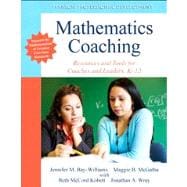Mathematics Coaching Handbook gives mathematics coaches and teacher leaders solid background information and hands-on tools for supporting their efforts to help K-12 teachers effectively teach mathematics in today’s diverse classrooms. With its focus on coaching and an actual coaching cycle—planning, data gathering, and reflection—coupled with over 100 ready to use tools for a variety of settings, it’s the perfect resource for busy and sometimes isolated teacher leaders. By connecting the Leading for Mathematical Proficiency (LMP) Framework to mathematics teaching practices and the CCSS Mathematical Practices, the authors specifically illustrate how to improve math teaching to promote student understanding and mathematics proficiency.








